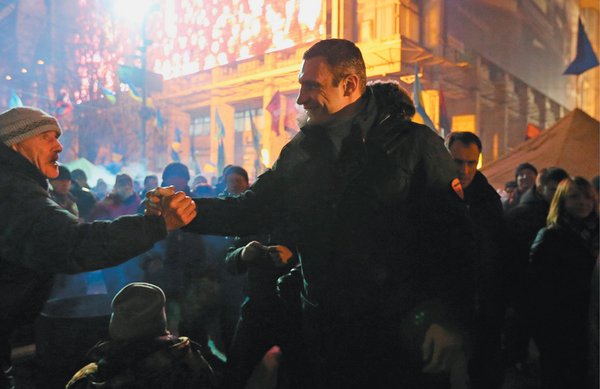
President Viktor Yanukovych apparently “signed a deal with opposition leaders to dilute his powers, form a caretaker government and hold early elections” according to The Washington Post. I know it is easy to get behind on international news and politics, so the Post had a wonderful piece that answers some of the most basic questions regarding the Ukrainian situation and the protests involved. The protests revolve around Yanukovych’s rejection of greater economic integration with the European Union. But why? As a recent article in The New York Review of Books explains, this integration was
an aspiration that for many Ukrainians means something like the rule of law, the absence of fear, the end of corruption, the social welfare state, and free markets without intimidation from syndicates controlled by the president.
The course of the protest has very much been influenced by the presence of a rival project, based in Moscow, called the Eurasian Union. This is an international commercial and political union that does not yet exist but that is to come into being in January 2015. The Eurasian Union, unlike the European Union, is not based on the principles of the equality and democracy of member states, the rule of law, or human rights.
On the contrary, it is a hierarchical organization, which by its nature seems unlikely to admit any members that are democracies with the rule of law and human rights.
The most interesting bit, however, was the following about the claim that these protestors are Nazis:
Why exactly do people with such views think they can call other people fascists? And why does anyone on the Western left take them seriously? One line of reasoning seems to run like this: the Russians won World War II, and therefore can be trusted to spot Nazis. Much is wrong with this. World War II on the eastern front was fought chiefly in what was then Soviet Ukraine and Soviet Belarus, not in Soviet Russia. Five percent of Russia was occupied by the Germans; all of Ukraine was occupied by the Germans. Apart from the Jews, whose suffering was by far the worst, the main victims of Nazi policies were not Russians but Ukrainians and Belarusians. There was no Russian army fighting in World War II, but rather a Soviet Red Army. Its soldiers were disproportionately Ukrainian, since it took so many losses in Ukraine and recruited from the local population. The army group that liberated Auschwitz was called the First Ukrainian Front.
There is much, much more. With Russia’s recent barring of journalist and former Moscow correspondent David Satter just prior to the Sochi Olympics, it might be worth taking a look at this troubled country and the people who suffer because of it.